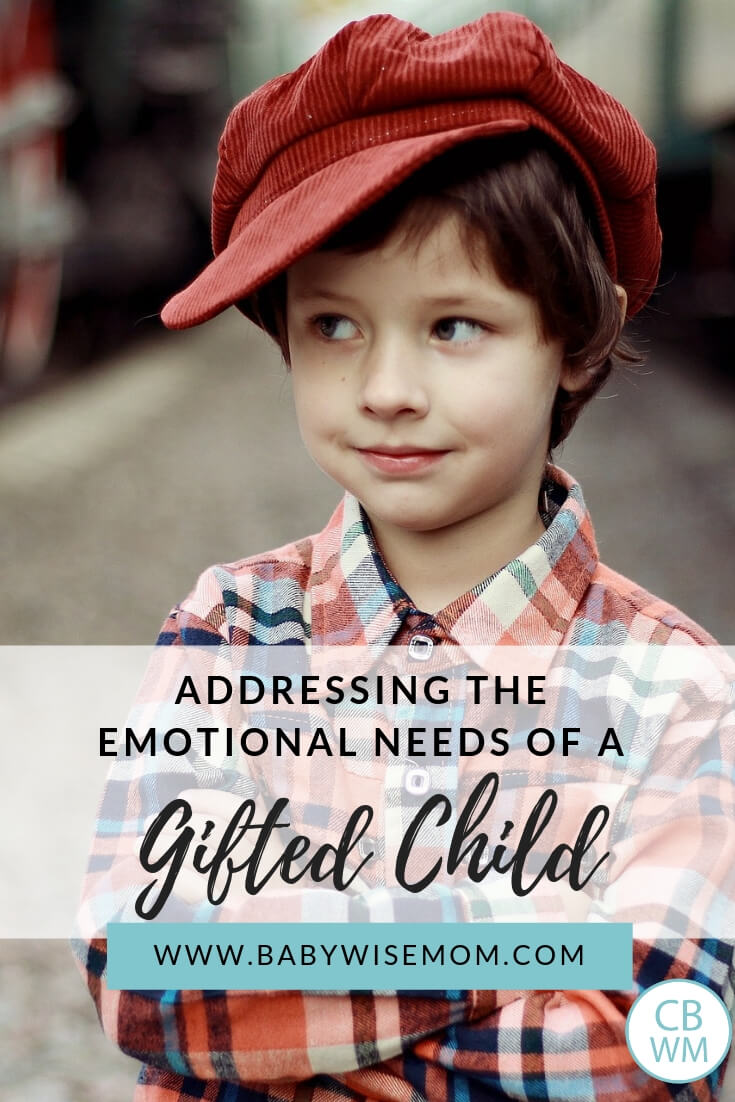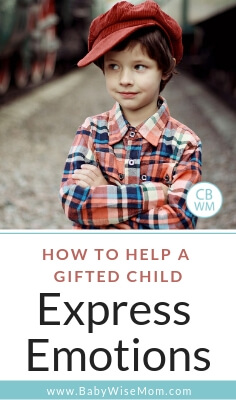Addressing the Emotional Needs of a Gifted Child. Gifted children have intense emotions and need help learning to recognize and control emotions.

It is always important to remember that a key characteristic of a gifted child is that the child has some personal deficits. While the child might be super bright at math, she might be super behind on social skills. You can read more on 15 Common Characteristics of Gifted Children
It is important to recognize where your gifted child is gifted and where your gifted child might be slower. You can read up on Recognizing Various Areas of Giftedness in this post.
A common deficit among gifted children is in the area of feelings and emotional needs. The child might feel things quite intensely and be unable to express them properly. The child might have a hard time recognizing and respecting the emotional needs of others.
The book A Parent’s Guide to Gifted Children states:
Gifted children not only have advanced mental abilities but also unusually strong emotions. They ahve hte same feelings as others, but they experience them more intensely. page 37
Because of this, a gifted child very much needs to learn to express emotions appropriately. All children and people need to do this, but a gifted child who cannot do this will be even more dramatic and intense than the typical child.
Post Contents
Teach Your Gifted Child Feelings and Neither Right Nor Wrong
It is important for your child, and for you, to recognize that feelings are neither right nor wrong. It is very normal to have a feeling in response to a situation. What isn’t okay is to express that feeling however we want to. That means if we are mad, we don’t get to stomp around and yell. If we don’t get our way, we don’t get to have a tantrum or even go sit and sulk.
The book A Parent’s Guide to Gifted Children states that people can’t really control their immediate emotional response to a situation, but they can and should control the behaviors they use to express emotions.
Start the process of addressing emotional needs by allowing your child to feel and learn to recognize what those feelings are. You want to help your child work through emotions, not stifle them.
Recognize and Label Feelings
A great strategy for helping children recognize feelings is to parrot what is coming from them. “You don’t get to watch the television show you wanted. You look sad about that. Are you feeling sad?” This is often called “reflecting.” You basically think of yourself as a mirror who can help the child understand what emotions she is feeling.
This is something I often do with my youngest child, Brinley. She really won’t calm down until she feels understood. I need to say, “You are crying because McKenna isn’t playing with you. How does that make you feel?” She will then reply, “Sad!!!” and I say, “You are crying because you are sad because McKenna isn’t playing with you. I am sorry.” Then I give her a hug. She can then calm down because she knows she was understood.

We take for granted the fact that we know what an emotion is. In reality, we often feel one thing and act out on it in another way. We might feel jealous and present that as anger. Then we think we are mad at someone when we are really just jealous. So even adults can benefit from really recognizing and labeling feelings.
From a young age, I play a fun little game with my children to help them learn to name emotions. We look at each other and take turns expressing an emotion. I will say, “I am going to look….happy!” Then I put a happy expression on my face. Next my child goes and says her own emotion. We go back and forth. With my daughters, I have often done this as I did their hair in the mornings.
This game is super simple, but super effective. As the child gets better and better at recognizing emotions, you can add complexity to the emotion. You start with mad, then over time move to variations of mad such as frustrated or annoyed.
You can also open conversations up about feelings and emotions by reading books with emotions as topics.
Do Not Dismiss Emotions
When reflecting, you want to be cautious that you aren’t putting feelings on your child that your child isn’t feeling. As soon as the child is old enough, you can ask the child how something makes him feel.
If a child expresses an emotion, do not tell your child he is wrong and that he is actually feeling some other emotion. This can express to the child that he is not capable of understanding his own emotions or that the emotion he knows he is feeling is a bad or wrong emotion.
Find Underlying Issues
Usually, an emotion comes from some underlying issue. If your child is feeling anxious, it is usually because of some threat your child perceives in her future. When your child is feeling an emotion and has strong feelings coming out, think about what deeper concerns this might be manifesting as for your child.
Conclusion
Emotions are complex. Many adults do not understand their emotions. Give your child a healthy start on life by helping him or her learn to recognize the emotions she is feeling. Assure her feelings are not wrong and also are not right. They just are. While emotions just are, actions can be right or wrong, so actions need to learn to be controlled. Find the underlying issues behind the emotions so those issues can be addressed. When you do these things, you will be setting up your gifted child for emotional success in life!

